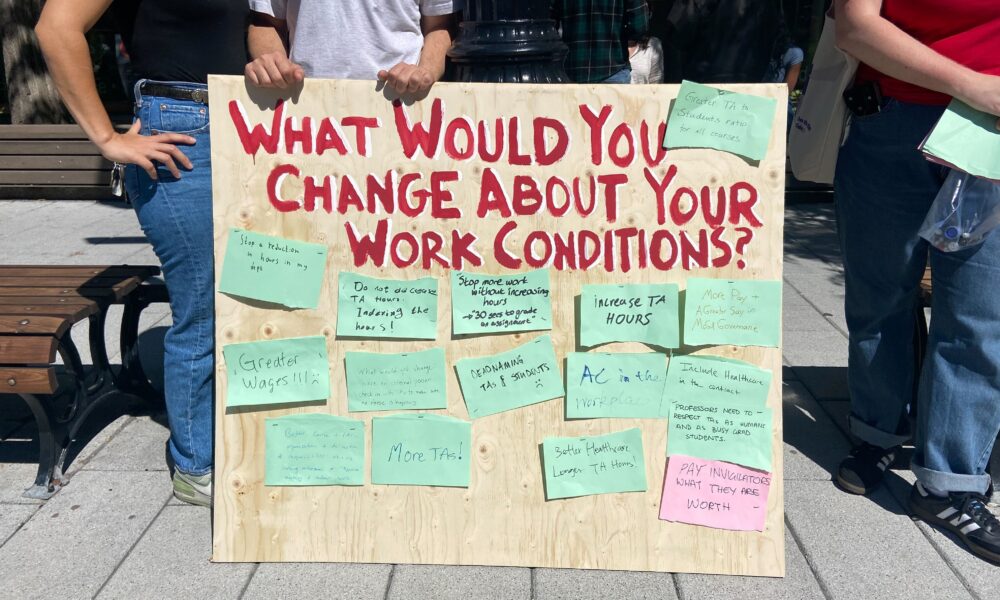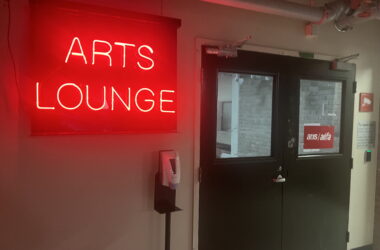Call-and-response chants of “Union! Power!” punctuated the Association of Graduate Students Employed at McGill (AGSEM)’s back-to-school rally on Sept. 4. AGSEM, the union representing teaching assistants (TAs), exam invigilators, and Academic Casuals such as graders and tutors at McGill, held the event to mark their full return to instruction after a lengthy TA strike in the spring.
The strike, which lasted three weeks, came to an end on April 15 when AGSEM and the university formed a new collective agreement (CA) dictating pay and working conditions for graduate employees. Although the CA ensured a pay raise for TAs—six per cent retroactively and three per cent in future years—McGill has not yet met the deadlines for remittance established by the back-to-work protocol agreed upon.
The university agreed to compensate TAs for any unpaid hours worked before the strike. They additionally agreed to retroactively compensate TAs by paying the difference in the hours paid at the pay raise level established by the new CA versus the original pay level. According to rally organisers, McGill committed to paying AGSEM members for all hours worked at the base pay level by June 20 and then with retroactive effect by July 19; however, McGill has yet to finish making these payments.
AGSEM delegate and McGill Physics TA Nick Vieira expressed the need for pressure against the university to receive the benefits of the CA in a speech at the rally.
“This contract doesn’t mean a whole lot unless we work with each other to defend and follow it, and unfortunately, at every turn, McGill has not followed that […] contract,” Vieira said.
In a written statement to The Tribune, McGill’s Media Relations Office (MRO) reported that the university has been “in a transition period” since reaching the CA with AGSEM in the spring. The MRO maintained that they continue to collaborate with the union on any outstanding issues.
AGSEM organisers also reintroduced their No More Free Hours campaign at the rally, urging attendees to keep careful track of their time worked this school year. Vieira explained in his speech that 48 per cent of TAs at McGill work an average of 13 hours over their contract, which amounts to $470 CAD of unpaid labour per semester.
Vieira also spoke to the importance of continuing to advocate for the union and its members’ rights.
“We went on strike, we worked hard to get it, we owe it to those who came before us, and we owe it to ourselves to defend our contract,” Vieira said.
Speakers at the rally additionally addressed the labour negotiations that have begun between AGSEM’s invigilator unit and the university in advance of the expiration of the current, invigilator-specific CA. Magnus L’Argent, President of AGSEM, reported that the union hopes to raise the current invigilator wage of $18 CAD an hour due to understaffing and the physically demanding nature of the role.
In a statement to The Tribune, the MRO expressed optimism about future negotiation with AGSEM’s invigilator unit.
“As for negotiations with AGSEM’s invigilators’ unit, the collective agreement expires in December 2025 and we expect the negotiations will go well,” the MRO wrote.
Several other McGill unions showed their support at the rally, including the Association of McGill Professors of the Faculty of Arts and the Association of McGill Professors of Law (AMPL), who are currently on strike.
Evan Fox-Decent, the President of AMPL, addressed the crowd—including many fellow Law professors associated with the union—outside the Bronfman Building.
“Only by working and fighting together will you make your working conditions and our students’ learning conditions better for all, and keep us together as a community and not […] splintered […] as McGill would otherwise [want],” Fox-Decent said.
Similarly, Dallas Jokic, an AGSEM member involved with CA negotiations during the winter 2024 term, affirmed the importance of inter-union support.
“The employer has a lot of advantages against us […] access to the fanciest union-busting lawyers that money can buy, [and] they have connections [among] politicians and in the media,” Jokic said. “But the advantage that we unambiguously have over the employer is that McGill works because we do.”








